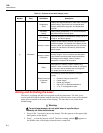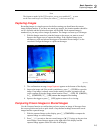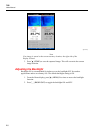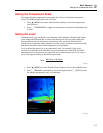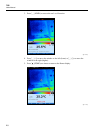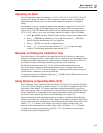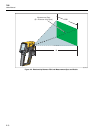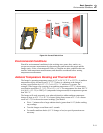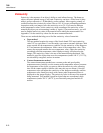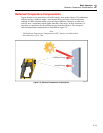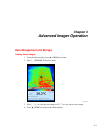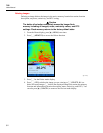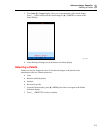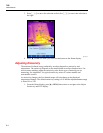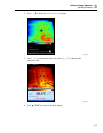
Ti20
Users Manual
2-12
Emissivity
Emissivity is the measure of an object's ability to emit infrared energy. The hotter an
object, the more infrared energy it will emit. Emissivity can have a value from 0 (shiny
mirror, perfect reflector) to 1.0 (blackbody, perfect emitter). Most organic, painted, or
oxidized surfaces have emissivity values close to 0.95. If you are performing qualitative
inspections with your imager, leave the emissivity set at 1.0. If you need to measure
actual temperature values, set the emissivity value according to the emissivity of the
material the object you are measuring is made of. Again, if you need accuracy, you will
need to find the emissivity value of the material before taking the measurement. See
Appendix C for the emissivity values for the most common materials.
There are two methods that help you to find the emissivity value of materials:
• Tape method
The tape method requires the usage of the Scotch brand PVC tape (emissivity
value 0.97) or equivalent. Cover the surface you want to measure with tape. Wait
some seconds for the temperature to stabilize. Set the emissivity of the Imager at
0.97 and measure the temperature. Make a note of the temperature value. Then,
remove the tape and measure the new temperature value. Adjust the emissivity
accordingly until the temperature value found previously is displayed on the
Imager. This emissivity value is the one of the material being measured. This
method is good for objects that are at low temperatures (under 100 °C (212 °F)),
not electrically energized, and not in motion.
• Contact thermometer method
The contact thermometer method uses a contact probe and good quality
temperature meter. Initially, use the contact probe temperature meter to measure
the temperature of the object you want to know the emissivity value, allowing
time for the contact probe to stabilize (this may take up to a minute). Note the
temperature value and adjust the emissivity on the Imager accordingly until the
temperature value found previously with contact probe temperature meter is
displayed on the imager display. This emissivity value is the one of the material
being measured. This method is good for objects that are at moderately high
temperatures (under 250 °C (482 °F)), not electrically energized and not in
motion.



